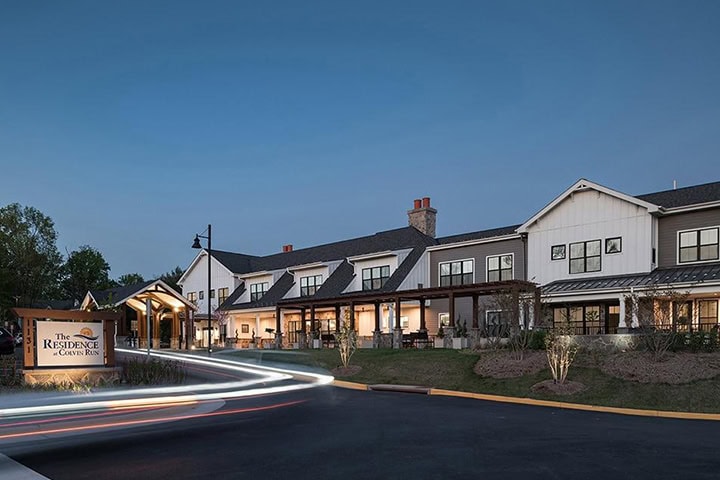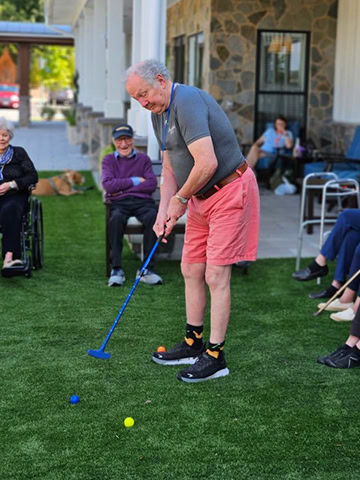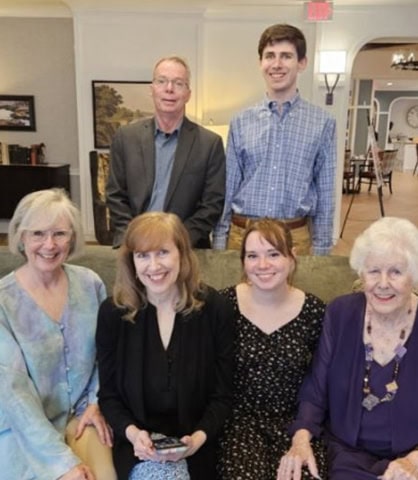
Deciding to move a loved one into an assisted living facility is never easy. It’s a decision accompanied by a whirlwind of emotions—guilt, worry, and sometimes, yes, even relief. However, recognizing when it’s the right time for assisted living can ensure that your loved one receives the care, support, and social interaction they need and deserve.
But how do you know when that time has come? We’ve written a guide for families to help you navigate this challenging decision.
What is assisted living?
Assisted living is a housing alternative for senior citizens who require assistance with personal care needs, such as eating, bathing, dressing, etc. Some facilities also offer support with scheduling doctor appointments.
Residents also have access to shared spaces. For example, The Residence at Colvin Run offers its residents a bistro pub, fitness center, art studio, activity room, beauty salon, and more.

The Residence at Colvin Run, an assisted living facility, offers residents different social activities.
It’s important to note that senior living communities are staffed 24/7, so you can rest assured your beloved one will receive assistance and care whenever they need it.
Now that you know what assisted care living is, let’s look at some essential factors that will help you make the decision.
1. Struggling with daily activities
Recognizing when daily tasks become challenging or unmanageable can indicate senior assisted living may be the best way to provide continued support and care.
Neglecting personal hygiene tasks, such as bathing, grooming, or dressing, might be a sign that your loved one needs more assistance than what you can provide at home. These tasks, while seemingly simple, are essential for maintaining physical health and emotional well-being. When they go unmet, it could indicate that daily self-care has become overwhelming.
Another warning sign is if they struggle with household chores like cooking, cleaning, or keeping their home organized. The inability to manage these tasks can result in unsafe conditions (i.e., expired food in the fridge, tripping hazards, or even fire risks from unattended stoves). In a senior living community, residents receive help with these chores, providing a clean and safe living environment.
Mobility issues are another critical factor to consider. If your relative is finding it difficult to move around the house or is at an increased risk of falls, this can lead to severe injuries. Assisted living facilities are designed with these challenges in mind, offering built-in support systems like handrails, emergency call buttons, and staff trained to assist with mobility, all contributing to a safer living environment.
These factors combined suggest that assisted living is not only a better option but a necessary one for their continued safety and quality of life.
2. Memory and cognitive decline
Memory issues are common as we age, but there’s a difference between forgetting where you left your keys and forgetting how to use them. Signs that cognitive decline might call for assisted living include:
- Confusion: Getting lost in familiar places or being confused about time and dates.
- Wandering: For those with dementia or Alzheimer’s, wandering can be particularly dangerous and is a strong indicator that more comprehensive care is needed.
- Poor judgment: Making decisions that are out of character or potentially harmful, like giving away large sums of money to strangers.
It’s important to add that if your loved one is experiencing some of those signs, they’ll need specialized care, such as Memory Care. So make sure the senior community you’re interested in includes a memory care program.
3. Social isolation and loneliness
Social interaction is vital in mental and emotional well-being, especially for elders. If your loved one starts withdrawing from friends and family, showing a lack of interest in social activities or hobbies they once enjoyed, they might be struggling with isolation. This withdrawal can often lead to or worsen feelings of loneliness, which can have serious health consequences.
Additionally, signs of depression (i.e., persistent sadness, fatigue, or noticeable changes in appetite) can be amplified when someone is isolated from regular social contact.
Living alone without meaningful interactions not only heightens these symptoms but also diminishes their overall quality of life.
When looking for senior assisted living facilities, make sure they have daily social activities and common shared spaces. These will significantly improve their mental health and emotional well-being.
4. Unmanaged health issues
As health issues multiply, managing them at home can become increasingly difficult.
If your relative has multiple chronic conditions such as diabetes, heart disease, or arthritis, the need for regular monitoring and medication management can be challenging without professional help.
If this is the situation your family is going through, we suggest you review Respite Care options. These assisted living programs provide the support needed to manage health issues effectively.
5. Caregiver burnout
You can’t, and shouldn’t, overlook your own well-being. Caregiving is rewarding, but it’s also demanding. If you’re constantly overwhelmed or exhausted by caregiving duties, the responsibility becomes too much to handle alone. Neglecting your own health means that caregiving is taking a toll.
If you’re experiencing emotional strain, such as feelings of resentment, guilt, or frustration, it is also a sign of caregiver burnout.
You shouldn’t feel guilty about needing to hand over care for your parents or loved ones. Recognizing when professional assistance is necessary to ensure they receive the best support is also a sign of love.

Residents, their families, and caregivers at The Residence at Colvin Run, a senior living community, share a special moment.
Making the right choice
We know you’re facing a challenging situation, but you must approach it with compassion and honesty.
Remember, choosing assisted living doesn’t mean you’re giving up on your loved one—it means you’re making sure they are provided with the best care possible in an environment designed to support their needs. It’s a choice that can enhance their quality of life and bring peace of mind to your entire family.
In making this choice, you’re showing care and responsibility. We wish you strength and clarity as you navigate this decision.
If you’re looking for an Assisted Living Community in Great Falls, Virginia, call us at 703.223.5226.